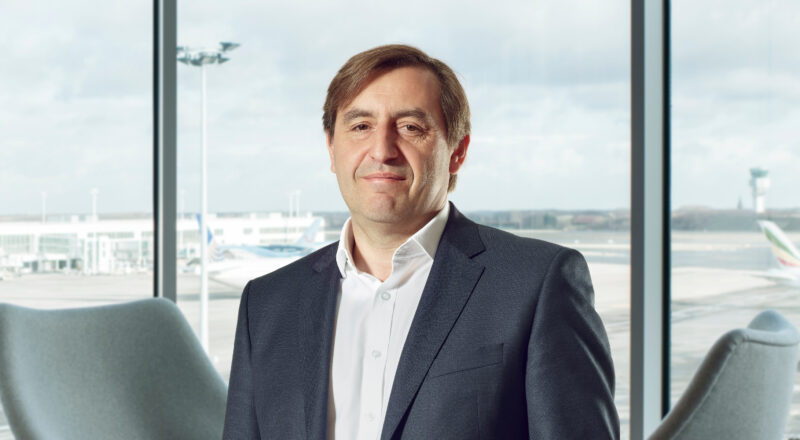Bernard Delvaux is the current CEO of Etex, and it’s in his office, on the 5th floor of the Passport Building at Brussels Airport, that he welcomes us. From the corner of the office you can see the planes parked on the tarmac, but the subject of the day is quite different. We’ve come to find out more about Etex, the company that hired the former head of Sonaca…
Founded in 1905 and based in Zaventem (Belgium), Etex is a family-owned global building material manufacturer and pioneer in lightweight construction.

Etex’s portfolio of solutions includes plasterboard, fibre cement boards and compounds, exterior cladding and residential solutions, fire protection, insulation and modular solutions.
« Etex operates over 160 facilities (factories, quarries and offices) in 45 countries, which enables us to be as close as possible to every client: homeowners, installers or construction companies » says Bernard Delvaux.
Sustainable responses to pressing challenges
In response to resource scarcity, climate change, rapid urbanisation and housing crises, Etex is focusing on lightweight solutions: a construction method that combines innovative indoor and outdoor solutions, the idea being to gradually replace conventional construction with buildings that have a lower carbon footprint and are fully recyclable at the end of their life.
R&D and innovation to support a changing sector
« Our ambition is to become a key player in the transformation of the construction sector. Every year, we invest more than €30 million in R&D and innovation, focusing primarily on lightweight materials and modular construction methods. The benefits of lightweight materials range from reduced consumption of raw materials and energy to reduced waste and emissions, increased circularity and the ability to deconstruct, reuse and recycle.
We are also working on improving materials such as low-carbon cement, recycling concrete and bringing ever more effective insulating materials to the market. We may not be sufficiently aware of it, but the construction industry and the use of buildings (including residential buildings) are among the biggest emitters of greenhouse gases. Renovating buildings is, in itself, a social issue!
Innovation and services as differentiators
As we have seen, R&D and innovation play a key role in bringing new materials and construction methods to market.
At the same time, Etex wants to differentiate itself through the added value of its services. « If I take fire protection as an example, we supply products and systems for the protection of buildings that are tested and certified, but that’s not all… Etex is clearly seeking to differentiate itself through its range of services and support: we carry out fire tests to ensure that products and systems meet the most stringent international regulations and standards. The tests carried out in the laboratories go beyond the legal requirements and simulate the real conditions in which products can be integrated. The fire safety engineer carries out a detailed risk analysis. In this case, the technical report on fire protection is a simulated demonstration of the effective protection of the building ».

[Construction vs Aeronautics] You joined Etex on 1 September, 2 years ago. What points of convergence and divergence do you see between the construction and aeronautics sectors?
« These two sectors have a lot in common, because they are both human organisations, with the same behaviours and the same levers for action.
The difference lies in the fact that aviation is a global sector: we design in design offices and we produce anywhere in the world, whether it’s Airbus, Boeing, Embraer, etc. Even though Etex is a multinational company, we don’t have a global business, we have a multi-local business; our products are more or less similar, but the use of the products and the markets are specific to each country. Another differentiating factor is the structure of the market: we have many more customers than in aviation, where the major manufacturers can be counted on the fingers of two hands. In a company like Etex, we have thousands of customers, which puts us in a very different negotiating position, enabling us to achieve different margins compared with the aviation sector and in particular the aerostructure sector, which does not include maintenance in its portfolio of activities ».
Would you like to comment on the announcements made by the Belgian companies at the 2023 Paris Air Show? Was there any specific announcement that caught your attention?
« It’s not because I’ve just come from there (smile), but it seems to me that one of the most significant announcements was Sonaca’s, which announced a new contract with Airbus to supply the trailing edge flaps for the A321XLR; the announcement of a new product is always good news! The extension of a historic contract to supply the leading edges for the A320 and A350 programmes is also significant, as the extension of existing contracts is never guaranteed ».

